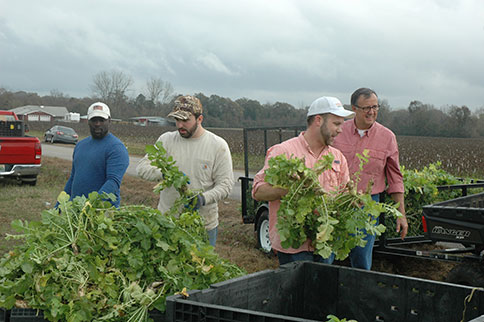
A pre-Christmas partnership between a local commercial bank, an area food bank and a local church’s feed-the-hungry ministry is helping fill empty stomachs in and around Atmore during the holidays.
About two dozen volunteers, including a contingent of seven United Bank employees that included the bank’s top officer, the pastor and members of Empowerment Tabernacle and representatives of Theodore-based Feeding the Gulf Coast met December 19 and gleaned white radishes from a 10-acre field owned by Jason Weber.
“They were looking for farmers to partner with,” Weber said as he and his son Jack demonstrated the proper way to wash and bundle the vegetables. “I’m not a produce farmer but I planted this as a cover crop. I was going to plow it under in the spring anyway, so I called (Feeding the Gulf Coast’s) Cindy (Bloom), she looked at it, and we went from there.”
The farm-fresh food also helped feed hungry people outside Escambia County. Pastor Darryl North said he was taking a load of the radishes, along with sweet potatoes that were donated by a third-party that did not wish to be recognized, to distribution points in Monroe and Conecuh counties.
“We’ve been connected with Bay Area Food Bank (Feeding the Gulf Coast’s predecessor) for about eight years,” said North. “Our church mostly serves Monroe and Conecuh counties because we have Atmore Area Christian Care Ministry that does this area. They pulled me in to help a little bit. I was excited when they told me we would be doing something in our city, so I told my team, ‘Let’s gather up and make this happen’.”
The Empowerment Tabernacle team included North, Jimmie Marshall, Randall Benjamin and Shaun Barron.
Bob Jones, president and CEO of United Bank, said the Farm to Table partnership with the area food bank was a new project, spearheaded by UB’s David Kitchens.
“This has been a new venture for us,” he said. “Around the country, Farm to Table is a big deal; it’s just never been well adopted in our part of the country. We realized that with our farm customers there’s a lot of opportunity, so we started trying to figure out how we could play a role in that.”
He said local and area farmers, even those who don’t grow food crops, were eager to help with the initiative. Bank officials are checking into a way to make that happen in the future.
“Several farmers have come to us and said that they don’t grow food, that they grow cotton or peanuts, and they ask if they can donate a bale of cotton and use the money to buy food,” Jones said. “That’s a whole different idea of it. A lot of the farmers don’t mind giving a portion of what they do, so we’re helping figure out how that can be done.”
Jones praised the food ministry administered by North and his church, pointing out that such involvement helps tighten the bond of community.
“Your ministry is just good stuff,” the banker told the pastor. “If you can take a gift like this and a few volunteers and turn it into something good, that’s what we’re all here for. Getting out and working together, that’s how we get to know each other, how you build a community. We’re making an impact here, but we’re also building relationships.”
Bloom also threw plaudits North’s way.
“He’s our biggest advocate up here,” said the food bank’s produce strategy manager. “He helps us find the people, since my office is in Theodore and Kyle’s (Schoolar) office is in Milton (Fla.). Physically, it’s hard for to get to know the people up here, so he’s our champion.”
Although this is the first year United Bank has taken part in the Farm to Table Initiative, the bank has long been an active player in the fight against hunger.
Schoolar, who is the group’s external relations and volunteer manager, said United Bank has been part of the food bank’s anti-hunger campaign for quite some time.
“We’ve worked together for years,” he said. “In fact, Bob Jones formerly served on our board, and our service areas kind of mirror each other. They have been a great partner, with their relationship with farmers and also to help fight hunger in the community.”
